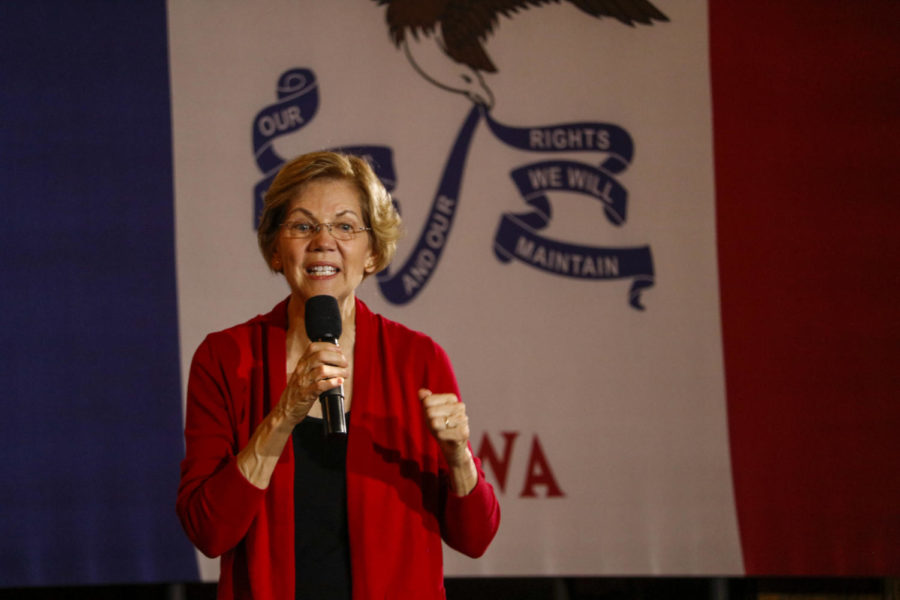Elizabeth Warren pushes turnout at Iowa State on eve of caucuses
February 2, 2020
In one of her final events before the Iowa caucuses Monday, Sen. Elizabeth Warren hosted a “Get Out the Caucus Rally” on Sunday in the Great Hall of the Memorial Union.
The chairs set up in the Great Hall were nearly full. There were hundreds of attendees; around half were standing to hear and see Warren speak. Warren supporters displayed round, light-blue stickers stating they intend to caucus for Warren.
A large sign adjacent to the stage displayed the phrase “THE BEST PRESIDENT MONEY CAN’T BUY,” highlighting how Warren’s campaign does not seek large contributions from wealthy individuals.
Warren took the stage in the Great Hall just before 3 p.m. The crowd erupted into applause, and many of the seated attendees took to their feet.
Warren opened her speech by introducing several family members attending the event and sharing her personal history. Warren said she worked as a special education teacher before attending law school.
With the Iowa caucuses taking place the day after the rally, Warren called on Iowans to canvass and participate in the process.
During a question and answer session, one person asked Warren how to respond to the impeachment proceedings.
“The president’s political party would lock arms and say the trial in America, as required by the Constitution, does not really mean fair trial,” Warren said.
Warren said the trial in the Senate lacked a presentation of evidence, documents and witnesses, even as more documents and witnesses became available.
Warren also spoke about her plan to reduce the influence of money in politics through campaign finance reform and lobbying.
“There are so many ways that rich people and giant corporations have figured out to invest in Washington in order to get the rules tilted in their favor, and they are reaping those benefits,” Warren said.
When asked of her plan to help educated Americans find jobs, Warren shared her plan for the American economy.
“Trickle-down economics has failed America monumentally, and it’s time to own up to it,” Warren said. “Trickle-down economics has been basically about 40 years now of saying, ‘help the rich and powerful, get richer and more powerful.’”
Warren said until 1980, corporations not only worked to benefit their shareholders but also their employees, their communities and their customers.
Corporations have now prioritized profits and saving money by moving jobs overseas and evading environmental regulations by creating profits in countries where environmental regulation is weaker, Warren said.
“That’s what’s taking the legs out from underneath our economy,” Warren said. “We need a different approach to our economy.“
Someone who identified themselves as an Iowa State faculty member asked Warren how she plans to end college debt. Warren responded by giving her plan for a wealth tax to fund programs that would alleviate student debt.
“Here’s how [the wealth tax] works: this is a tax, a two cent tax on fortunes above 50 million dollars; in other words, your first 50 million is free and clear,” Warren said.
James Black, a professor at Mercer University in Macomb, Georgia, said he attended the event to be involved in the political process and to learn who the best candidate is.
“One of the biggest issues I’m concerned about is China and how for years, they have been buying soybeans from Iowa farmers, and this year, the Iowa farmers have been put in grave financial danger because of the politics of a trade war,” Black said.
Black said he wants to see what the candidates are planning to do to help Iowa farmers.
Jenny Flint, a central Iowa community member, is a supporter of Elizabeth Warren. She said she likes how Warren works to support the middle class.
“[Warren’s] wealth tax is something that we’re big fans of,” Flint said.
Trevor Daniel Lyons, graduate student in materials science and engineering, stood at the event with several other students. He said he is a Warren supporter due to her stance on ending government corruption.
“For me, the difference between her and other candidates is more how she talks about issues,” Lyons said. “She really starts from attacking assumptions that normal politicians may kind of breeze over, […] and that comes through in her work.”
Lyon said Warren’s work following the 2008 financial crisis and her role in the development of the Consumer Financial Protection Bureau shows Warren can deliver on her promise to fight corruption.
“[Warren] knows right away what needs to be done and how to do it very quickly,” Lyons said.

















